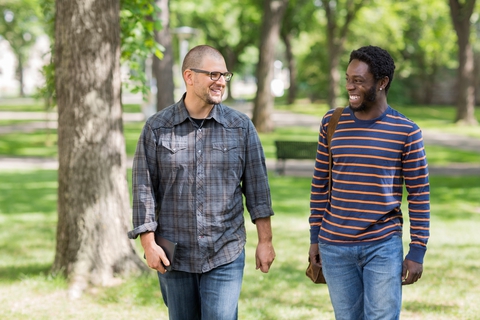CCARE Anti-stigma Campaign
Please take a moment to complete a one-minute survey: Members' Thoughts and Attitudes Web Survey
Stigma is when someone has a negative opinion of a person or group based on what they believe are negative characteristics. Stigma can lead to feeling shame or experiencing discrimination.
Stigma can affect everyone: members and their families, treatment professionals, and community activists. Everyone must work to lessen stigma.
Self-stigma, stigma you feel about yourself, can keep you from asking family, peers, and professionals for help and support. You may believe negative things others have said or believe you are unmotivated to change and should be able to stop on your own. These beliefs can make you feel less comfortable getting treatment.
Self-stigma can be lessened by learning about people recovering from substance use disorder. Community Care has partnered with the Life Unites Us Campaign, a statewide campaign to reduce stigma.


Ways to overcome self-stigma: Stories from Life Unites Us
- Show compassion for those with a substance use disorder.
- Let others know when they’re expressing negative attitudes toward people.
- Don’t keep feelings of shame or self-stigma to yourself; let others know how you feel.
Racial and Ethnic Disparities
Black People and Opioids
Black people are less likely to seek help for opioid use disorders than White people, in part due to a fear of being turned over to the criminal justice system, if they reveal their use of illicit substances.
Treatment providers are mandated by federal and state confidentiality laws to not repeat anything that is talked about as part of treatment.
Black People and Alcohol

Despite drinking less alcohol than White people, Black people have more problems with alcohol use than White people. Black people are more likely to be faced with legal problems because of drinking than White people, even if the same amount of alcohol is consumed in the same setting. Low-income Black men are at the highest risk of developing an alcohol use disorder, which is thought to be due to discrimination, racism, age, lack of a job, and financial instability. Read a study about the impact of alcohol use on African American people.
Hispanic/Latino People and Opioids

Hispanic/Latino people are also impacted by opioid use. Hispanic/Latino youth are using opioids at a higher rate than the general population in their age range. Hispanic/Latino youth admit to using pain pills to relieve pain, to help with feelings, or to help with sleep. If you are feeling pain, either physical or emotional, it is important to let your doctor know, because there might be better medicines to take to help relieve pain.
- Learn more from our Opioid Use Toolkit.
Hispanic/Latino People and Alcohol
While many Hispanic/Latino populations don’t drink alcohol as much as non-Hispanic populations, about 9.5% of people who are Hispanic/Latino have an alcohol use disorder during their life. Close to 10% of people who are Hispanic/Latino need treatment for alcohol use. Sometimes, Hispanic/Latino people do not get help because of translation issues. If you go to a treatment provider for help, they are required to get a translator to speak to you.
- More information on how the Hispanic/Latino population is impacted by alcohol use.
- Learn more from our Alcohol Use Toolkit.
Family support during treatment can have a positive impact, including talking about your family's own strengths, concerns, and needs. While there is a higher risk for substance use disorder in children of a parent who has an SUD, professional help can prevent and treat SUD.
There are many ways to lessen stigma. Visit the links to access resources to overcome stigma.
Medication and Support Groups
- If you want to stop using substances, you are motivated! Motivation is needed, but you also need talk therapy and life-saving medications to stop using substances.

- Medications, such as methadone, buprenorphine, or naltrexone, are life-saving treatments and the most effective intervention for people with an OUD.
You deserve these life-saving medications.
- You deserve medications to treat AUD like acamprosate, disulfiram, or naltrexone. Medications are used to treat all chronic health conditions, including substance use.
- Recovery is a marathon, not a sprint. Very few people will achieve abstinence after one treatment episode. Most people will need many months or years to achieve sustainable abstinence.
- Look for 12-step or mutual support groups that welcome people with an OUD who are taking medications.
Changing Language Resources
- Ask family members and friends to refer to you as a person who has an OUD, AUD, or SUD instead of other negative labels. You are more likely to recover when you have positive social support.
- Don't refer to yourself as a “drug addict,” “dope-fiend,” or "alcoholic." Instead, refer to yourself as a person who has an opioid use disorder (OUD), alcohol use disorder (AUD), or substance use disorder (SUD).
Substance Use Resources
- Choose empowerment over shame.
